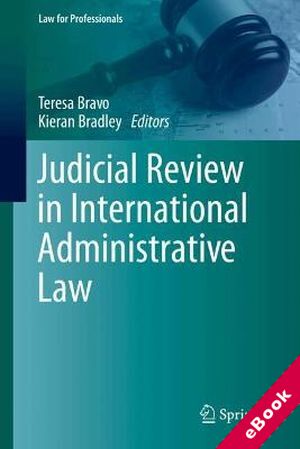
The device(s) you use to access the eBook content must be authorized with an Adobe ID before you download the product otherwise it will fail to register correctly.
For further information see https://www.wildy.com/ebook-formats
Once the order is confirmed an automated e-mail will be sent to you to allow you to download the eBook.
All eBooks are supplied firm sale and cannot be returned. If you believe there is a fault with your eBook then contact us on ebooks@wildy.com and we will help in resolving the issue. This does not affect your statutory rights.
This book addresses the topic of judicial review in international administrative law, focusing in particular on the case law of the most established international administrative tribunals (e.g the United Nations Appeal and Dispute Tribunals, the Administrative Tribunal of the International Labor Organization, the one of the Inter-American Development Bank Group, the International Monetary Fund, the World Bank and the Organization of American States) as well as, the major challenges faced by these jurisdictions at the present time, when dealing with grievances of international civil servants.
The book is composed of seven chapters, written by legal professionals (all of them with significant experience in international administrative law) and address different subjects, such as, "the doctrine of acquired rights", the institutional setting of the administrative tribunal of the Inter-American Development Bank Group, legal standing and the role played by staff associations in the context of judicial review of administrative decisions.
The purpose was to identify the main constraints staff associations face and discuss whether it is possible (and if so, how) for those associations to challenge decisions of an administrative and regulatory nature.
The three final chapters of the book are inter-related and address the most difficult challenges in this jurisdiction, since they focus on investigations for misconduct, including harassment, and disciplinary procedures.
The authors addressed the role and mandate of the investigators, the means at their disposal to pursue those functions, as well the different standards of proof applied by administrative tribunals to disputes in these areas.